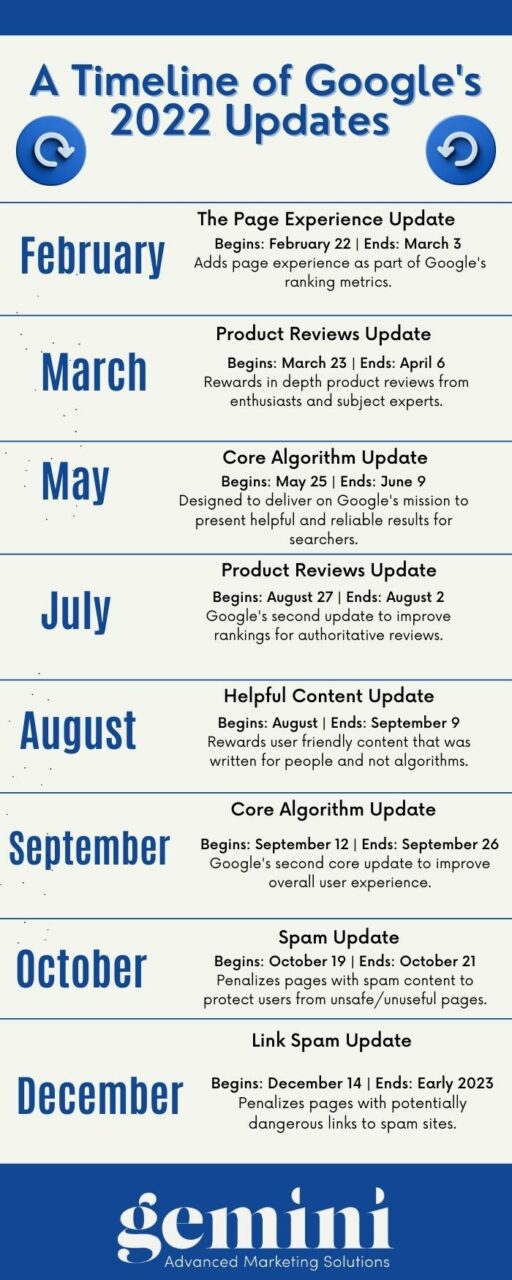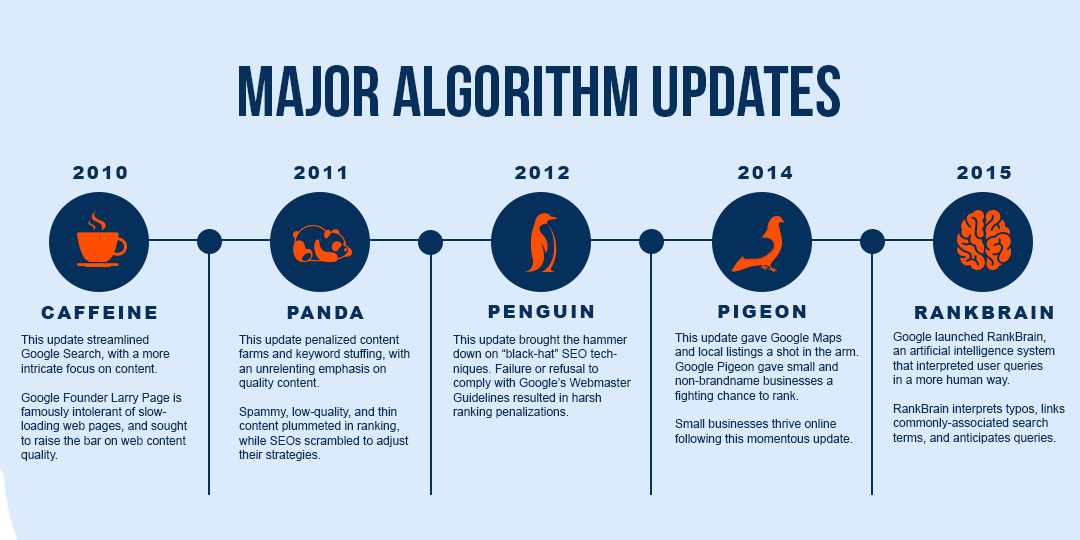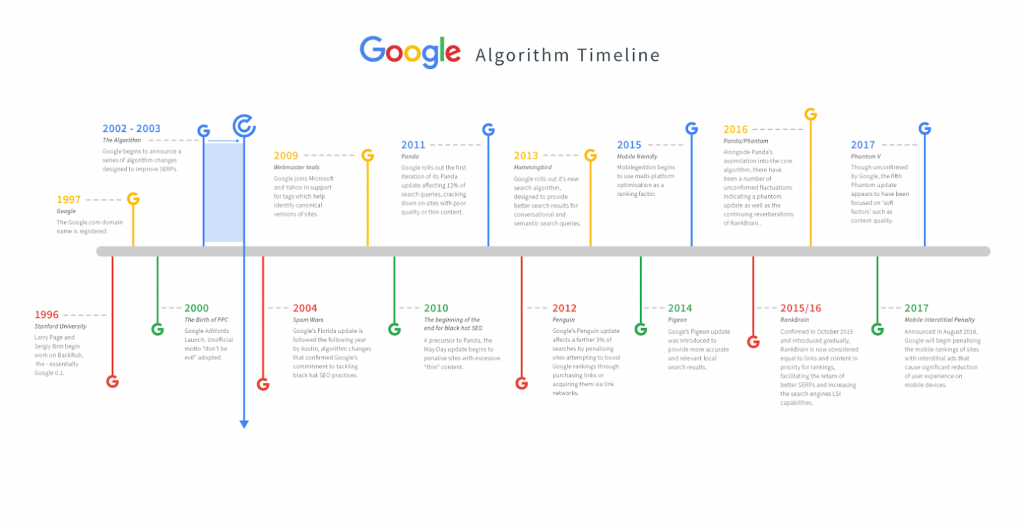Decoding Google's Algorithm Updates: A Plan for SEO Success
Wiki Article
Recognizing the Effects of Google's Formula Updates on Search Engine Optimization Positions and strategies
In the ever-evolving landscape of search engine optimization (SEARCH ENGINE OPTIMIZATION), the implications of Google's formula updates have actually ended up being a centerpiece for marketing professionals and businesses aiming to preserve or improve their on the internet exposure (Google’s Algorithm Updates). As Google remains to fine-tune its algorithms to provide customers with one of the most relevant and top quality search results, understanding just how these updates influence SEO methods and positions is extremely important. From the refined changes in keyword strategies to the much more pronounced emphasis on individual experience, the interaction between algorithm updates and search engine optimization techniques reveals a complicated web of considerations that require constant caution and versatilityDevelopment of Google's Algorithm

The Panda update, launched in 2011, targeted low-grade web content and penalized sites with replicate, slim, or unnecessary material. Penguin, released a year later, addressed link spam by decreasing the value of manipulative web links. Hummingbird, introduced in 2013, noted a shift in the direction of semantic search, understanding the context and intent behind customer questions instead of just matching key phrases.
These updates compelled website owners and search engine optimization professionals to focus on user experience, quality content, and all-natural link building techniques to improve their rankings in Google's search results. The evolution of Google's algorithm underscores the internet search engine's dedication to supplying relevant and useful content to customers while penalizing methods intended only at gaming the system.
Impact on Keyword Phrase Method
With the development of Google's algorithm in the direction of focusing on individual experience and material importance, the Influence on Key words Technique has actually come to be increasingly important for web site proprietors and search engine optimization professionals looking for to align with these internet search engine updates. Key phrases are no much longer almost matching search terms yet recognizing individual intent and supplying important web content. Google's updates, such as BERT and RankBrain, concentrate on all-natural language handling and context, making keyword strategy extra innovative.
Moreover, with Google's focus on semantic search and user-focused material, key words padding is no much longer efficient and can also damage rankings. Instead, integrating key phrases naturally right into top quality, appropriate content is essential. By comprehending the influence of Google's formula updates on search phrase strategy, web site proprietors can improve their SEO efforts and boost their visibility in search results.
Adjustments in Content Optimization
As the landscape of search engine optimization proceeds to advance, site owners and SEO specialists are seeing considerable shifts in material optimization approaches. In the wake of Google's formula updates, there has actually been an expanding emphasis on producing top notch, relevant, and authoritative web content that supplies value to customers. This suggests that just stuffing keyword phrases into articles is no more efficient; instead, web content has to be well-written, interesting, and tailored to meet the needs of the target market.In addition, there is a higher focus on customer experience and fulfillment, with search engines satisfying sites that offer a seamless browsing experience and beneficial details. As an outcome, content optimization currently includes not just including appropriate search phrases normally however additionally structuring content in a method that is simple to read and navigate.
Relevance of Customer Experience
Enhancing individual experience on a site is paramount in modern search engine optimization practices, functioning as an essential aspect in establishing a website's visibility and success in search engine rankings. User experience includes different aspects such as website speed, mobile-friendliness, intuitive navigating, and interesting web content (Google’s Algorithm Updates). Google's algorithms significantly focus on websites that provide a smooth and satisfying customer experience, as it straight associates with customer fulfillment and retentionA favorable customer experience not just enhances a site's search engine optimization efficiency but also contributes to higher conversion prices and customer loyalty. Internet sites that are easy to navigate, visually appealing, and provide useful web content are most likely to draw in and maintain site visitors. On the other hand, internet sites with bad user experience metrics might struggle with high bounce rates and reduced dwell times, signaling to look engines that the content might not be relevant or appealing for users.
Therefore, purchasing optimizing customer experience is important for maintaining an affordable side in the ever-evolving electronic landscape. By prioritizing user-centric design and performance, websites can boost their internet search engine rankings and ultimately drive even more organic website traffic and conversions.
Approaches for Future Adaptation
Moving on in the quickly progressing landscape of SEO, it is necessary for organizations to take click for more on innovative approaches for future adaptation. continue reading this One crucial approach is to concentrate on developing premium, pertinent web content that offers worth to users. This content must be maximized for search phrases that straighten with customer intent and must be routinely updated to remain present and affordable.Furthermore, businesses must prioritize mobile optimization to deal with the raising variety of customers accessing the web by means of smart phones. Making sure that internet sites lots promptly, are very easy to browse, and offer a smooth user experience on smart phones can assist improve search positions and user satisfaction.
In addition, leveraging information analytics and user actions insights can help services understand their target audience better and tailor their SEO strategies accordingly. By keeping an eye on essential performance signs and changing methods based on data-driven insights, organizations can stay ahead of the curve and adapt to the ever-changing SEO landscape. Embracing emerging modern technologies, such as voice search optimization and expert system, can additionally be beneficial for future-proofing SEO strategies.
Final Thought

With the development of Google's formula towards prioritizing customer experience and content importance, the Impact on Key words Approach has ended up being progressively crucial for website owners and Search engine optimization professionals seeking to align with these search engine updates. Google’s Algorithm Updates. Keyword phrases are no much longer just regarding matching search terms yet comprehending individual intent and delivering beneficial material. Google's formulas significantly focus on sites that use a seamless and gratifying customer experience, as it directly associates with user complete satisfaction and retention
In contrast, internet sites with bad individual experience metrics may endure from high bounce rates and low dwell times, signaling to browse engines that the material might not be interesting or pertinent for individuals.
The advancement of the formula has shifted emphasis in the direction of individual experience and high quality material, influencing keyword approach and content optimization.
Report this wiki page